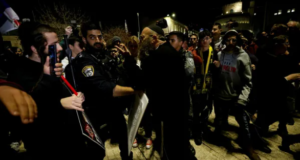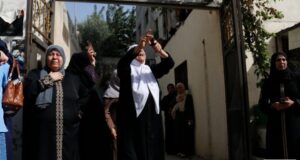Ofra Edelman | Haaretz
3 January 2010
A complaint to the court ombudsman against Jerusalem District Court Judge Yitzhak Milanov reveals cooperation of questionable legality between the police and Oz, the Interior Ministry unit that deals with illegal foreigners, in the treatment of foreigners who took part in recent demonstrations in East Jerusalem’s Sheikh Jarra neighborhood.
According to the complaint – which was submitted to the ombudsman, former Supreme Court justice Eliezer Goldberg, on December 17 – the police misused their authority by handing the left-wing foreign activists they arrested over to Oz, even though the foreigners were present in Israel legally and therefore do not fall under Oz’s jurisdiction. The police’s motive, the complaint alleged, was to avoid judicial review of the arrests.
About three weeks ago, it said, 23 demonstrators were arrested, including three foreign citizens: Bruno Marcotte of Canada, Johanne Richtmueller of Germany and Ryan Olander of the United States. On December 12, they were brought before Judge Milanov for a remand hearing. The police asked the court to order the foreigners held for four hours to give the force time to hand them over to Oz.
The hearing began at 10 P.M. According to attorneys Iftach Cohen and Omer Shatz, who represented the three foreigners, the police did everything in their power to ensure that their case was heard last, hoping that Oz agents would arrive in the meantime and take charge of the foreigners – thereby avoiding judicial review of the arrest, which by law must take place within 24 hours of its occurrence.
The three ended up being detained for 30 hours. Their lawyers repeatedly requested that Milanov hear their cases before some of the others, fearing that Oz would take charge of the detainees before the judge had reviewed the arrest. However, they said, the judge denied this request and even refused to allow it to be entered into the court records. Attorney Lea Tsemel, who was present at the time, confirmed this claim.
At about 1 A.M., after the Oz vehicle had arrived at the court house, a police representative informed the lawyers that he was withdrawing his request for the foreigners’ remand. But just then, the three foreigners were brought into the court by mistake, and the judge reviewed their arrest anyway.
The judge noted in the protocol that the police did not oppose releasing the three foreigners, but had asked to have them handed over to Oz. He also noted that they were present in the country legally.
‘No authority to arrest’
According to attorneys Cohen, Shatz and Tsemel, Milanov then informed the two Oz representatives in the court that since the foreigners were here legally, Oz had no authority to arrest them. When one Oz representative told the judge that they would nevertheless detain the foreigners after the hearing, Milanov warned him not to repeat that remark.
Milanov released the three without any restrictions and wrote in his decision: “To the degree that the Oz unit is authorized to investigate them, it will surely operate within the bounds of its authority.” The judge then entered his adjacent chamber, with the door to the courtroom left ajar.
That, the complaint said, is when the Oz officers took the foreigners away by force. The court guards actively cooperated, it charged, and the police declined to interfere.
Milanov, too, declined to intervene, and did not even respond to the lawyers’ cries, the complaint continued. “The complaint is not being lodged due to Judge Milanov’s behavior during the hearing, but to his failure when it was over,” the attorneys wrote.
‘Kidnapped from court’
After being seized by the Oz officers, the three were held for a few hours at the court – “with the cooperation of the court guards and under the eyes of the district court judge,” the complaint said.
The attorneys therefore requested that the ombudsman examine “Judge Milanov’s serious failure in disregarding and turning his back on the three foreigners who were kidnapped from his court.”
Cohen argued that Oz had no authority to detain the three after the session, particularly since the judge wrote expressly in the stenographic record that they were present in the country legally. But the commander of the Oz unit, Yehuda Ben Ezra, disagreed.
“I don’t know if the judge examined the documents,” he said, adding, “The visa says ‘tourist,’ not ‘demonstrator’.”
When informed that the judge explicitly told the Oz representatives in court that further detention would be illegal, Ben Ezra responded, “With all due respect to the judge, and I have genuine respect for judges, they don’t decide whom I arrest or don’t arrest.”
Ben Ezra said he is “allowed to make arrests in two cases: if I suspect that someone is here illegally, or if he violated administrative rules and the police informed me of this.” But the three foreigners do not fit into either of these categories.
A week later, on December 18, Ryan Olander was arrested again at another demonstration in Sheikh Jarrah. This time, according to Cohen, members of the Oz unit managed to take him from the court before a judge had reviewed his arrest, after police requested that Oz “act to remove this tourist from Israel permanently.”
Cohen said that Olander’s visa was canceled only after he was taken to Givon Prison – meaning the Interior Ministry essentially legalized his illegal arrest retroactively.
The Jerusalem District Police responded that “The foreigners who were arrested were suspected of disorderly behavior and illegal assembly. At the same time that they were brought to the court, the police made contact with an Interior Ministry representative, informed him of the three’s arrest and asked him to continue dealing with the case against the three. The police intend to press charges against all the suspects.”
Police rejected the claim that “the three foreigners were not brought for an extension of their remand at the beginning of the session on purpose” and said that “according to the law, police are permitted to arrest a tourist with a valid visa who is suspected of a criminal offense and transfer him to Interior Ministry representatives for deportation or trial. In this case, members of the Oz unit are the representatives who work with the police.”
Both Oz and the police completely rejected the attorneys’ claim that such cooperation between them occurs only in the case of left-wing activists.
 International Solidarity Movement Nonviolence. Justice. Freedom.
International Solidarity Movement Nonviolence. Justice. Freedom.


